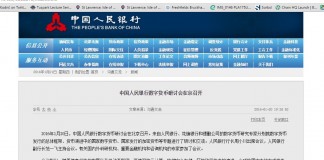One of the earliest and most frequently mentioned blockchain technology use cases is in international payments. One of the providers making payments faster, easier and cheaper using blockchain technology is London- and Beijing-based Remitsy.
Remitsy is a payments platform for businesses sending payments to China. Using it, overseas companies are delivering Renminbi to recipients in China at a fraction of the cost of traditional methods. Unlike the majority of existing solutions, Remitsy convert at the mid-market rate (real exchange rate) and their pricing is completely transparent. What’s more, funds are delivered from bank to bank in hours instead of days. It matches Bitcoin sellers in Europe with Bitcoin buyers in China, so businesses can send local currency - US Dollar, Euro, Pound, Hong Kong Dollar and Polish Złoty, and receive payments in Yuan, at only 1 -2.5 % fees fee, depending on the chosen arrival time of only 6-72 hours. Remitsy is powered by the latest blockchain technology, and is regulated as a licensed Money Services Operator in Hong Kong.
Thanks to Remitsy Web Developer Wendy Chan for the interview and presentation.
How long does Remitsy exist and how ready-to-use is it?
Remitsy was started in April 2015 and the platform has been growing very quickly since then. We are currently in BETA, but we are already taking a handful of business customers. We have recently integrated our first client via API. Companies can either book individual payments through our web UI, or connect to our Mass Payout API, allowing automated delivery of RMB funds to multiple recipients, via bank transfer or to Alipay account, which is a widely popular payout option in China. And we intend to release our API openly in the future.
Your focus is on businesses with international supply chains, unlike other international payments providers focusing at remittances. Why did you decide to focus on businesses first and are you planning to later include individuals, too?
We only support business payments for goods or services at the moment, since we are exceptionally cautious about Risk & Compliance. As our business evolves, we have started to take payment from or to individuals, but the payment has to be for business purpose. By focusing our service on enterprises sending payments to China, our ability to combat the risk of money-laundering is significantly enhanced.
In China, there are strict controls on capital. In order to work within the existing restrictions, all our transactions are current account transactions as payment for goods and services. We are working with foreign-based companies buying Chinese goods (anything from samples, professional/marketing fees, or whole shipments for instance) or paying subcontractor invoices in China. This is an area where there is a clear benefit to all parties in more efficient trade, which is something the government supports.
Working with business-only accounts help us gain almost 100% retention. As a B2B business, the client relationships are key and all our business is repeat business. We believe that we have really nailed down our competitive advantages in what is a very niche (but huge) market. We are happy to see that we have helped plenty of small and medium size businesses to save the cost of payment and better predict their profit margin.
What would be the different requirements between providing B2B payments or remittances?
Compared with individual remittances, B2B payments have extra compliance requirements. B2B payments require due diligence on both sides of the transaction, which is a key service we provide on top of money conversion and delivery. One of our founders, Richard Bensberg, has years of experience in Compliance and Risk Control, therefore we are very proud that we can guarantee high reliability of transaction. In China, there are a lot of different suppliers with a wide variety of payment requirements, some prefer RMB denominated transactions, while others prefer using their USD balance to apply for tax rebates. It is important we check prior to initiating the payment to guarantee a smooth process. Also, as we are making B2B payments, it is all about individual approach. So far, our customers have been satisfied by the customer service and support we provide.
As you are dependent on Bitcoin buyers and sellers, how do you ensure liquidity?
To date, China has the second largest bitcoin industry in the world. There’s great liquidity in Bitcoin trading. The fact that we operate in China ensures liquidity, yet we are constantly monitoring the market.
Why did you decide to focus on China first and are there any other markets you are interested in next and why?
Both of our founders, Richard Bensberg and Neil Woodfine, have many years of experience in China and they both speak perfect Mandarin Chinese (even with a bit of Beijing accent!). Their expertise in manufacturing industries and financial risks in China provides deep knowledge and unique insights in developing our business. They have personally felt the pain that many businesses face when making payments to China.
When it comes to payments to China, there is a myriad of different settlement routes available. Sometimes the China company will have a HK Trading Company to which it receives payments in USD, sometimes they will be happy to receive USD bank wires direct to their China company, other times you will be requested to make a payment using Paypal or Western Union. These payment channels charge processing fees, exchange rate spread, and withdrawal fees. The overall transaction cost can be as high as 9% of the total invoice value. There is a big inefficiency in the way international payments are handled today, and we want to solve it by making the whole process direct and efficient. We deliver the funds to the company supplying the products, thus the risk of additional counterparties (such as trading companies / individual bank accounts / moneygrams) is avoided.
How many users - or prospective users - do you have and how are you aiming to increase usage?
We currently have a handful of business customers and we receive new enquiries and requests almost every day! So far, our existing clients have had good experience with us.
Furthermore, we have recently partnered with a UK company. We provide them a payment solution plugin to their platform via our API, which enable them to have a CNY payout option for their Chinese users. This successful partnership has encouraged us to seek further partnership opportunities and explore what the market needs and how our product can fit in.
Whereas the onboarding process for a business is explained here , how can Bitcoin buyers and sellers get involved?
We don’t actively engage with bitcoin buyers and sellers, as our core business is focused on payments. We work with trusted exchange partners to provide the access to bitcoin liquidity.
What are your next steps?
Currently we are testing the market-product fit, as we see a lot of new use cases and clients on the horizon who can be benefit through our product. We are exploring ways to create unique solutions to solve specific business problems. We see many value-add opportunities in the China trade corridor where blockchain technology can be applied to provide efficiencies.
We are also exploring opportunities in expanding our international markets, specifically in Africa and Southeast Asia where the demand in cross-border payment to China is high. There will be something exciting coming up very soon on Remitsy. Stay tuned!
If you want to learn more, email [email protected]. Remitsy also organises the Beijing Bitcoin Meetup.










